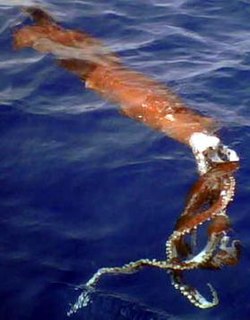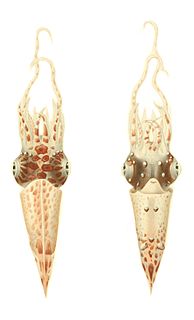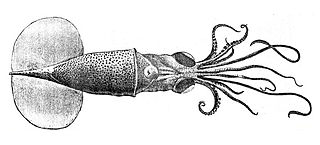
A squid is a mollusc with an elongated soft body, large eyes, eight arms, and two tentacles in the superorder Decapodiformes. Like all other cephalopods, squid have a distinct head, bilateral symmetry, and a mantle. They are mainly soft-bodied, like octopuses, but have a small internal skeleton in the form of a rod-like gladius or pen, made of chitin.

The hooked squid, family Onychoteuthidae, currently comprise about 20–25 species, in six or seven genera. They range in mature mantle length from 7 cm to a suggested length of 2 m for the largest member, Onykia robusta. The family is characterised by the presence of hooks only on the tentacular clubs, a simple, straight, funnel–mantle locking apparatus, and a 'step' inside the jaw angle of the lower beak. With the exception of the Arctic Ocean, the family is found worldwide.

Onykia ingens, the greater hooked squid, is a species of squid in the family Onychoteuthidae. It occurs worldwide in subantarctic oceans.

Asperoteuthis acanthoderma is a large species of squid belonging to the family Chiroteuthidae. It is characterised by the tiny, pointed tubercules present on its skin and a Y-shaped groove in the funnel locking apparatus.

Thysanoteuthis rhombus, also known as the diamond squid,diamondback squid, or rhomboid squid, is a large species of squid from the family Thysanoteuthidae which is found worldwide, throughout tropical and subtropical waters. T. rhombus is given its name for the appearance of the fins that run the length of the mantle. They are a fast growing species with a lifespan of approximately 1 year. The diamond squid is the only cephalopod species known to be monogamous. T. rhombus often preys on fish and other small cephalopods at varying water depths. This species is commercially fished in Japan, specifically in the Sea of Japan and Okinawa.
Moroteuthopsis is a genus of squid in the family Onychoteuthidae. The type species is Moroteuthopsis longimana.

Asperoteuthis is a genus of chiroteuthid squid comprising four species:
Alloteuthis africana, also known as the African squid, is a species of squid in the family Loliginidae. This species of squid is restricted to the Guinean province. To identify the Alloteuthis africana from other Alloteuthis congeners, it is highly recommended to measure the width of the squids head and the sucker size.

Pterygioteuthis giardi is a species of squid in the family Pyroteuthidae. It is known as the roundear enope squid. The specific name honors the French zoologist and marine biologist Alfred Mathieu Giard (1846-1908).

The colossal squid is part of the family Cranchiidae. It is sometimes called the Antarctic squid or giant cranch squid and is believed to be the largest squid species in terms of mass. It is the only recognized member of the genus Mesonychoteuthis and is known from only a small number of specimens. The species is confirmed to reach a mass of at least 495 kilograms (1,091 lb), though the largest specimens—known only from beaks found in sperm whale stomachs—may perhaps weigh as much as 600–700 kilograms (1,300–1,500 lb), making it the largest known invertebrate. Maximum total length has been estimated at 10–14 metres (33–46 ft). The colossal squid has the largest eyes of any known creature ever to exist.

Planctoteuthis danae, or Dana's Chiroteutid squid is a species of chiroteuthid squid. It is distinguished from further members of Planctoteuthis by a fin length greater than half of the mantle. During the paralarval stage, the species occurs in depths of 200–300 m, progressing to 200–800 m at 10-15mm ML; larger specimens have been captured from 700 m to in excess of 1000 m. The type locality of P. danae is in the Gulf of Panama, and it has also been recorded from the eastern Pacific Ocean and North Atlantic Ocean.
Asperoteuthis lui is a chiroteuthid squid of the genus Asperoteuthis. This species was discovered from the stomach contents of a ling, a species of fish. The damaged specimen did not include a funnel or a mantle, but had multiple arms, one tentacle, and eyes. It was initially identified as a species of giant squid of the genus Architeuthis.
Broadnose skate is a species of skate in the family Arhynchobatidae. This fish occurs on 28 to 604 meters, mostly at depths shallower than 250 meters, from Valdivia and Estrecho de Magallanes to Argentina and the Falkland Islands. It has the maximum total length of about 125 centimeters which it reaches in about 20 years. Both sexes reach maturity at age 8–10 years.
Illex argentinus, commonly known as the Argentine shortfin squid is a species of squid in the family Ommastrephidae from the south western Atlantic Ocean.

Illex coindetii, commonly known as the southern shortfin squid or broadtail shortfin squid, is a species of neritic squids in the family Ommastrephidae. They are found in the Mediterranean Sea and on both sides of the north Atlantic Ocean.

The graytail skate, or gray tail skate, is a large species of skate in the family Arhynchobatidae, native to the south-western Atlantic Ocean and south-eastern Pacific Ocean. It is listed as endangered by the IUCN. It was caught as part of a commercial fishery around the Falkland Islands and is a bycatch in several other fisheries.
Sthenoteuthis pteropus, also known as the orangeback flying squid or orangeback squid, is a species of cephalopod in the family Ommastrephidae. It is native to tropical parts of the Atlantic Ocean where it is found to depths of about 200 m (656 ft).
Lampadioteuthis megaleia is a small, colorful squid from the family Lycoteuthidae, it is the only species in the only genus in the monotypic subfamily Lampadioteuthinae, it is sometimes known as the wonderful firefly squid. It differs from the other species of the Lycoteuthidae mainly by having a hectocotylus in the males and by the possession of a rostrum on the gladius.
Narrowteuthis is a monotypic genus of squid, the sole member is Narrowteuthis nesisi, from the family Neoteuthidae. It is known from just two specimens caught off the Canary Islands at 27°18'N, 19°44'W.

The European flying squid is a species of squid from the continental slope and oceanic waters of the eastern Atlantic Ocean and the Mediterranean Sea. It is the type species of the genus Todarodes, the type genus of the subfamily Todarodinae of the pelagic squid family Ommastrephidae. It is a species which is targeted by some fisheries, although it is more often a bycatch.












